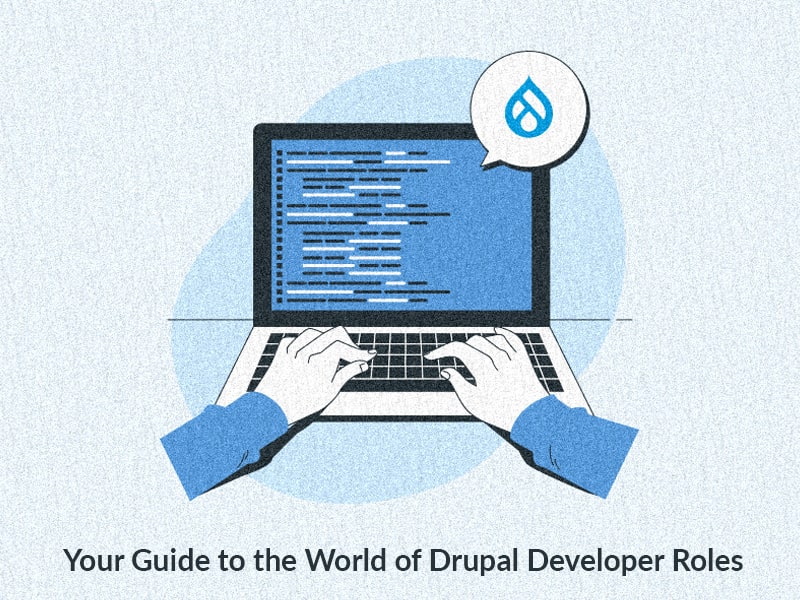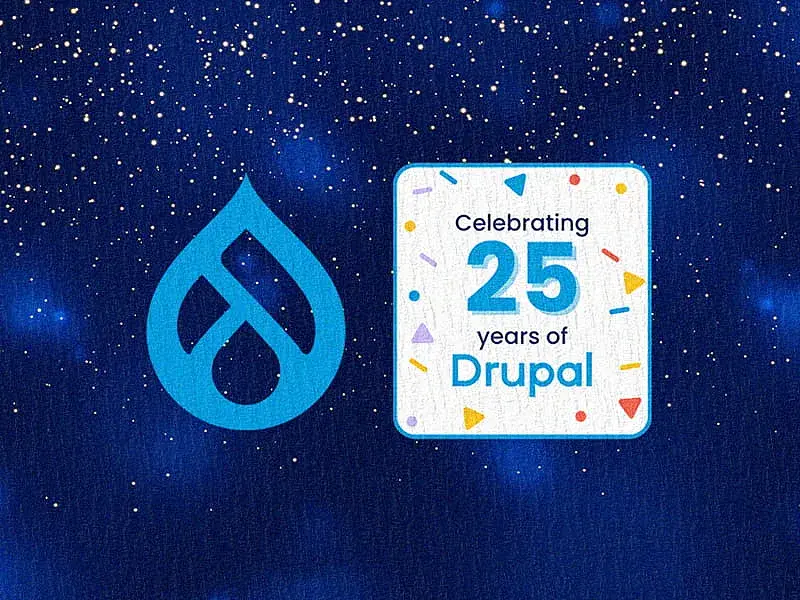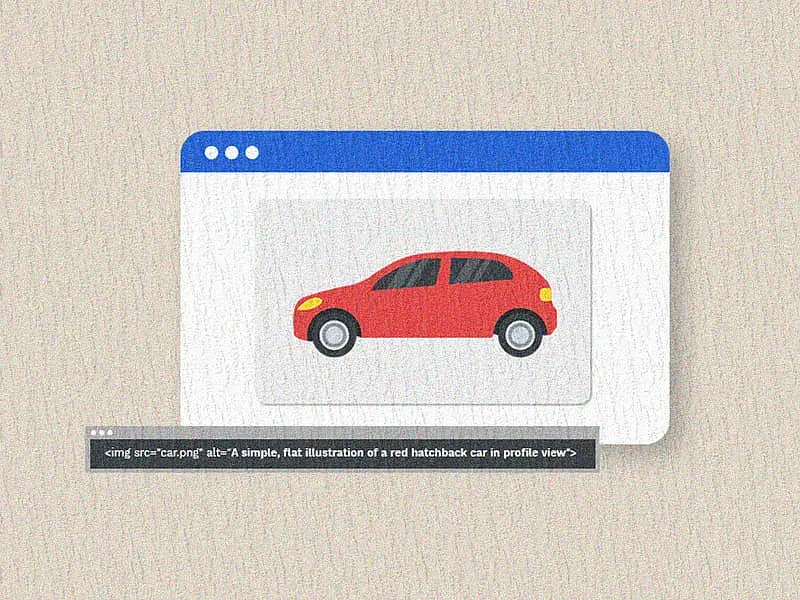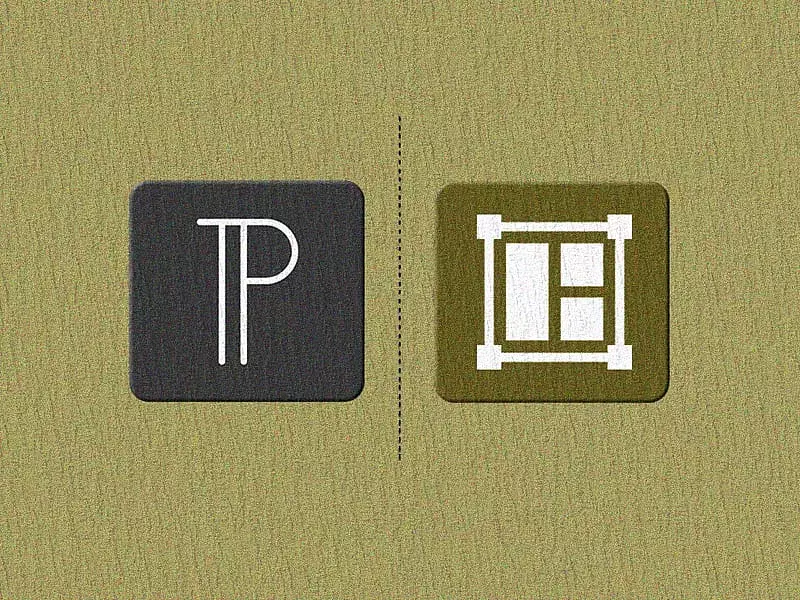So you wish to start your career in Drupal and want to explore the best path forward. You turn to Google, searching for the most popular, or rather high-paying (pun intended ;)) Drupal gigs. But is that enough? Aren’t you missing a critical factor - the relevant skills required for each of those roles?
If you have done a background check on Drupal by now, you already know that Drupal is evolving as a powerful and versatile CMS. It is trusted by many popular organizations for their online presence like Tesla, the United Nations, Oxford University, the Indian Government, and more. Drupal, being an open-source platform, also opens up numerous career opportunities.
So, if you aim to thrive in the world of Drupal, you probably have a bunch of questions running through your mind. Questions like what is the role of a Drupal developer, what are the benefits of pursuing a career in Drupal, and what skills do a Drupal developer need for such a career?
In this blog post, we will answer all your pressing questions, including one of Drupal’s most notorious conundrums - Is it hard to learn Drupal?

Why Choose a Career in Drupal
A career in Drupal can offer several benefits for individuals who are passionate about Drupal web development, content management, and digital technology. Here are some of the benefits of a career in Drupal:
- High Demand for Drupal Developers: Due to its scalability and secure nature, Drupal is widely used by organizations, government agencies, and businesses around the world to build and manage their websites and web applications. Therefore, there’s a constant demand for skilled Drupal developers and administrators, making it a lucrative career choice.
- Open-Source Community: Drupal is an open-source platform with a vibrant and supportive community of developers, designers, site builders, and users. Being a part of this wide community can bring you valuable networking opportunities, access to resources, and the chance to contribute to different Drupal projects while enhancing your skillset.
- Continuous Learning and Skill Development: The constant evolution of the Drupal ecosystem opens up the gateways to learning and applying new skills regularly. This can keep your career interesting and help you stay competitive in the field.
- Competitive Salaries: As a Drupal developer or professional, you can often expect to earn competitive salaries due to the specialized skills and the demand for such expertise. Salary levels may vary based on factors like expertise, experience, location, and job role.
- Remote Work Opportunities: Drupal development and support can often be done remotely, allowing you to work from anywhere with an internet connection. What better flexibility can anyone want? A better work-life balance that allows you to choose your preferred work environment!
- Opportunities for Freelancing and Consulting: You get the option to work as a freelancer or consultant, as you can take on a variety of projects for different clients. This provides you flexibility and independence in your career.
- Job Security: With more and more organizations switching to Drupal as their CMS of choice, the demand for Drupal professionals to maintain, update, and expand these websites and applications keeps growing, providing a level of job security.
- Contribution to Open Source: Working with Drupal allows you to contribute to the open-source community by developing modules and themes, or contributing to the core Drupal project. This can be personally fulfilling and enhance your professional reputation.
What is the Role of a Drupal Developer
Drupal development encompasses a variety of job roles, each of which demands specific expertise and skills. Let’s dive into seven of the most popular Drupal developer roles:
Drupal Site Builder
A Drupal Site Builder primarily focuses on configuring and customizing Drupal's core features and contributed modules to create functional websites. As a site builder, your role isn’t typically about writing code but leveraging Drupal's flexibility through its user-friendly interface. You will need to collaborate with designers and themers to ensure that the website's appearance aligns with the project's design goals. You will also be responsible for user management, quality assurance, and documentation.
Skills Required:
You will need to have a deep understanding of Drupal’s architecture, the admin interface, modules, configuration, and how the platform works. You also need to be good at Content modeling, basics of theming, understanding user roles (and setting them up), using Views and layouts, and working knowledge of version control (Git), HTML, and CSS (basic skills).
Along with these technical skills, you will need to be good with communication, troubleshooting, and problem-solving while continuously keeping up to date with the evolving Drupal platform. Based on your knowledge and understanding of Drupal's admin interface, modules, and configuration options, you can grade the level of your role as a Drupal Site Builder.
Front-end Developer
A Front-end developer’s job revolves around the appearance of a website. As a Drupal Front-end Developer, you will be responsible for the look and feel of a Drupal site. Drupal offers a platform to build custom themes for websites. You’ll be mostly working with HTML, CSS, JavaScript, and Drupal theming to create custom themes and translate design mockups into functional web pages.
You’ll focus on the alignment of the site's visual elements with the design mockups, improving the overall user experience by optimizing website performance, enhancing navigation, and ensuring that user interactions are smooth and intuitive. You need to also ensure that the websites are responsive and look good on all screen sizes.
Skills Required:
For this role, you need to have practical knowledge and proficiency in proper HTML5/XHTML elements while coding, writing modern CSS, PHP, JavaScript, jQuery, and Drupal theming techniques. You should be able to use Twig on projects effortlessly. You need to be smooth with building user interfaces for websites or web applications. Make sure you are excellent at writing JavaScript without using jQuery or other frameworks. You’ll also have to be comfortable working with Firebug, Chrome Inspector, and other similar debugging tools.
Beyond these technicalities, you should also understand the importance of CSS changes to maintain the consistency of style across platforms and browsers, keeping accessibility concerns in mind. Additionally, you should be able to fill in design gaps and convert comprehensive layouts and wireframes into basic HTML pages.
Back-end Developer
As the name suggests, your work here revolves around the back end of the website. As a Drupal Back-end Developer, you’ll have to work on the server side of Drupal, implementing custom functionality, creating custom modules, and optimizing performance.
You will also be responsible for integrating databases and ensuring the security of the website. Other crucial tasks include configuring server settings (web server, database server), integrating third-party APIs with the website, and of course, troubleshooting and debugging.
Skills Required:
If you want to pursue this role as part of your career, make sure that you gain proficiency in developing web solutions in Drupal and PHP implementations in a LAMP environment. Besides, you’ll need to upskill yourself with PHP files, theme functions, and the Drupal theme layer.
Your abilities must align with architecting Drupal enterprise solutions including data, display, and information architecture. Develop an advanced understanding of site-building, including a deeper analysis of Drupal modules like CTools, Views, and Panels, along with creating custom modules.
Additionally, creating responsive websites would require you to have the technical know-how of Drupal’s API, along with HTML, HTML/HTML5, CSS/CSS3, JavaScript/jQuery, MySQL, Drupal's API, and server-side technologies. It would be much easier for you to have a good understanding of Software Development and hands-on experience with Agile or iterative SDLCs.
Module Developer
What is Drupal without modules and module developers? One of the intricate Drupal roles, as a Module Developer, you are expected to create custom Drupal modules to extend the CMS's functionality. Your responsibilities include working on complex projects that require unique features.
Typically, as a module developer, you will write, modify, and optimize PHP code to build and enhance Drupal modules. All of this while making sure to follow Drupal coding standards. You’re not only responsible for building modules but also maintaining them, updating them, and making sure they stay relevant and compatible.
Skills Required:
For a Module Developer, it’s essential to have strong PHP programming skills and a deep understanding of Drupal's architecture, without which your role of creating custom modules would be incomplete. Drupal demands the implementation of some commonly used design patterns for which you need to have a basic understanding of the factory pattern, late static bindings, software, and other design patterns.
Additionally, you should have a baseline understanding of dependency injection as part of the OOP design patterns. Besides other frameworks, you need to have experience dealing with Symfony framework, plugin functionalities, and services containers.
Drupal Technical Architect
A Drupal Technical Architect is responsible for designing and overseeing the technical aspects of Drupal projects. In this role, you’ll be focusing on high-level planning and architecture, defining the technical requirements, choosing appropriate modules and technologies, and ensuring that the Drupal solution aligns with the project's goals and scalability needs.
Your job will be to engage in requirements gathering, solution design, and architectural decision-making. You’ll also be required to guide different development teams, review code, and ensure that best practices and Drupal standards are followed. All in all, you’ll be responsible for creating a robust technical foundation for Drupal projects.
Skills Required:
Pursuing this career path will require you to have in-depth knowledge of Drupal's performance-related modules and server optimization. You’ll have to be proactive and be able to understand all the key aspects of a project. Acting as the leader of Drupal projects, you’ll have to have knowledge and understanding of the backend, frontend, and site-building task statuses of a project. Additionally, you should have a deep understanding of optimizing Drupal for which you’ll need an expertise level of PHP, jQuery, MySQL, CSS, and the implementation of Varnish, GeolP, UberCart, and other technologies.
Drupal Project Manager
Your role as a manager magnifies in the field of Drupal. As a Drupal Project Manager, you’ll be handling different Drupal development projects. Your job is to ensure that the projects meet client requirements, stay on schedule, and stay within budget. You will be acting as the bridge between clients and developers. As a Drupal project manager, you will need to use project management software to track the progress of your team’s Drupal tasks and to monitor milestones.
Skills Required:
Greater responsibilities occur with a huge skill set. As the manager here, you’ll have to acquire good project management skills and abilities to work with software like Jira and Redmine, familiarity with Drupal development processes, and excellent communication abilities.
Apart from these role-demanding skills, you should also have a basic knowledge of web technologies, and an understanding of budget, target, goal setting, and negotiation skills. As a Drupal Project Manager, you’ll be expected to be a leader who’s client-focused, pays attention to detail, and works autonomously.
Is it Hard to Learn Drupal?
The answer to this question is quite straightforward. If you’re a web development enthusiast, you’ll enjoy the journey towards learning something new, and the level of challenges won’t matter. But if you are completely new to web development and Drupal, it becomes a little tricky.
Learning Drupal can be both rewarding and challenging. While the platform's user-friendly interface makes it accessible for beginners, mastering the more advanced aspects, such as custom module development and performance optimization, can be demanding.
However, the good news is that the Drupal community offers extensive resources, tutorials, and support to help developers at all levels. Drupal’s latest strategic initiatives like the Project Browser, Automatic Updates, Easy out of the box, Recipes, and others, are paving the way for an easier learning curve as the aim is to make Drupal easier for new Drupal users.
With dedication and a structured learning path, anyone can become proficient in Drupal development.
Final Thoughts
Drupal offers a wealth of opportunities for you to embark on a rewarding career. With its high demand, versatility, and strong community support, Drupal is an excellent choice for aspiring developers.
Whether you're interested in site building, theming, or back-end development, there's a role for you in the Drupal ecosystem.
So, if you're ready to embrace the world of Drupal development, start building your skills and join the thriving community of Drupal enthusiasts today!







